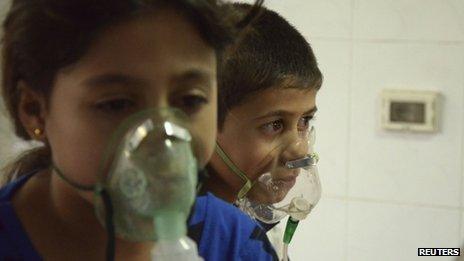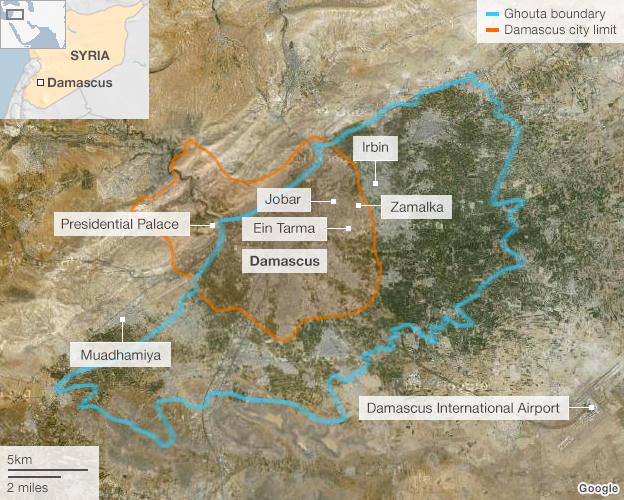UN: Alleged Syria chemical attacks 'serious escalation'
- Published
The BBC's Emily Thomas: "Scene of horror in the rebel-held suburbs"
UN officials say alleged chemical weapons attacks which Syria's opposition says killed hundreds near Damascus were a "serious escalation".
Deputy Secretary-General Jan Eliasson made the comments after briefing an emergency UN Security Council meeting about Wednesday's incident.
The Security Council also said that clarity was needed over the attacks.
Some 35 member states called for UN weapons inspectors already in Syria to be dispatched immediately to the scene.
Opposition activists said that more than 1,000 people were killed after government forces launched rockets with toxic agents into the Damascus suburbs in the Ghouta region early on Wednesday.
The Syrian government has denied the allegations, describing them as "illogical and fabricated". The Syrian army said the opposition made up the claims to divert attention from the huge losses its forces had suffered recently.
The BBC has been unable to independently confirm the death toll.
Calls for clarity
"There must be clarity on what happened and the situation must be followed closely," Argentina's UN ambassador and current Security Council president, Maria Cristina Perceval, said after a closed-door meeting on Wednesday evening.
Council members also "welcomed the determination of the Secretary-General (Ban Ki-moon) to ensure a thorough, impartial and prompt investigation", she added.
Mr Eliasson, who also spoke to reporters after the meeting, said any investigation into the incident would require the consent of the Syrian government and was dependent on the security situation.
This followed calls by some 35 member states - including the US, UK and France - for the UN chemical weapons inspectors that are already probing three sites of alleged chemical weapons use in Syria to be dispatched immediately to the scene to investigate.
The inspectors arrived in Damascus on Sunday with a mandate to investigate three locations including the northern town of Khan al-Assal, where some 26 people were killed in March.
Jan Eliasson: "This represents, no matter what the conclusions are, a serious escalation with grave humanitarian consequences"
But the official Syrian Sana news agency said reports of the latest attack were "baseless", describing them as "an attempt to divert the UN chemical weapons investigation commission away from carrying out its duties".
BBC correspondents say China and Russia - which have repeatedly backed the Syrian government since the crisis began - blocked a stronger security council press statement supported by the 35 states.
Convulsions
Opposition activists say the attack took place as part of heavy government bombardment in the region surrounding Damascus, with government forces trying to drive out rebel forces. The areas said to have been affected included Irbin, Duma and Muadhamiya.
Activist footage shows dozens of bodies with no visible signs of injuries, including small children, laid out on the floor of a clinic. Other videos show people being treated in makeshift hospitals, with victims, including many children, having convulsions.

Many children were among those clearly shown in distress in activist footage
While it is not clear how many died in the bombardment of the sites and how many deaths were due to any exposure to toxic substances, experts say it would be almost impossible to fake so many dead and injured including children and babies.
Ghazwan Bwidany, a doctor treating the injured, told the BBC the main symptom, especially among children, was suffocation, as well as salivating and blurred vision.
Prof Alexander Kekule, of the Institute for Medical Microbiology at Halle University in Germany, told the BBC that one of the videos - although of poor quality - was consistent with the aftermath of an attack with a chemical agent.
But he added that none of the patients showed typical signs of sarin or other organophosphorous nerve agents, or signs of blistering agents.
International concern
On Thursday French Foreign Minister Laurent Fabius said there needed to be "a reaction of force" if the use of chemical weapons were to be proven.
However, Mr Fabius ruled out the possibility of sending troops into Syria.
The US expressed its "deep concern" over the alleged chemical weapons attacks on Wednesday and formally requested the UN to "urgently investigate".
The alleged attack comes a year after US President Barack Obama warned the Syrian government that using chemical weapons would cross a "red line".
Meanwhile, UK Foreign Secretary William Hague said that if confirmed, the attacks would mark a "shocking escalation in the use of chemical weapons in Syria".
But the Russian foreign ministry noted that the reports had emerged just as the UN chemical weapons inspection team had arrived in Syria, saying that "this makes us think that we are once again dealing with a premeditated provocation".
Both the rebels and government forces have accused each other of using chemical weapons throughout the 28-month conflict.
It has not been possible to independently verify the claims.
In July 2012, the Syrian government implicitly admitted what had long been suspected - that Syria had stocks of chemical weapons.
Experts believe the country has large undeclared stockpiles of mustard gas and sarin nerve agent.
Damascus said the weapons, stored and secured by the armed forces, would never be used "inside Syria", but could be used against an external attack.
